How Do You Actually Remove Monzo Gambling Block?
Monzo’s gambling block wasn’t an issue until I tried removing it. Over 700,000 customers use this feature, blocking £9 million in gambling transactions during 2024 alone – that’s £800,000 monthly, up 20% from 2023. After partnering with GamCare, the bank added longer cooldown periods and a “note to future you” feature, making removal deliberately difficult. The block flags merchant category codes from gambling operators, catching betting shops, online casinos, and sports betting apps. Since September 2023, it even blocks Pay by Bank transactions through open banking integrations, closing that loophole completely.
Trusted List of Non Limits Casinos

100% Up to 500 €/$/£ + 250 FS
Curacao eGaming Authority
Cosmobet combines extensive crypto payment options with instant transactions and offers a comprehensive platform featuring both casino games and a full sportsbook, making it ideal for players seeking flexibility in both gaming options and modern payment methods. 6,000-7,000+ games including slots, table games, live casino games with live dealers, and sportsbook. Over 100+ game providers including Evolution Gaming, Pragmatic Play, NetEnt, Microgaming, Big Time Gaming, Hacksaw Gaming and many others.

Up to £3,000 + 200 FS
Cyprus company. Anjouan Offshore Financial Authority, Curacao and Tobique.
Fortunica offers an all-in-one gambling experience combining casino games with a comprehensive sportsbook, plus an exceptional 99-level VIP loyalty program that provides automatic enrollment, progressive cashback up to 10%, weekly reload bonuses, and exclusive access to the Wheel of Fortune feature. 5,000+ games including slots, table games (blackjack, roulette, baccarat, poker), live dealer games, video poker, instant win games, scratch cards, and a sportsbook. Popular Providers: Booongo, Slotopia, Endorphina, Gamzix, Swintt, Playson, Evoplay.

330% Up to £2500 + 300 FS
Evoplay Winter Wins - Prise Pool £6000
Curaçao Gaming Control Board
Santeda International Limited
Velobet delivers a comprehensive crypto-friendly platform with advanced betting features like an integrated Bet Builder tool, AI-powered risk tracker, and in-house exclusive slot games, combining a massive game library with competitive sportsbook markets and exceptionally generous cryptocurrency bonuses up to 160% for crypto deposits. 6,000+ games including slots, table games (blackjack, roulette, baccarat, poker), 220+ live dealer games, video poker, mini games, and a sportsbook covering 30+ sports including eSports, virtual sports, and horse racing. 80+ game providers including NetEnt, Microgaming, Big Time Gaming, Nolimit City, Hacksaw Gaming, Red Tiger Gaming, Yggdrasil and many others.
What’s the actual cooldown period you’re dealing with

When you first set up the block, Monzo forces you to pick a cooldown – anywhere from 48 hours to a full year. That’s the mandatory waiting period between deciding to lift the block and actually being able to gamble again. No instant removals. No exceptions.
The data from December 2024 shows the average self-imposed cooldown has jumped from three months to ten months. And get this – 41% of users now choose the maximum 12-month period. That’s a massive shift. When I check the app settings, the options are 2 days, 1 week, 1 month, 3 months, 6 months, or 12 months. Most people – 75% according to Monzo’s internal data – go for at least 48 hours.
If you picked a year-long cooldown back when you were feeling responsible, you’re stuck with it. The app won’t let you shorten it mid-way through. The only workaround is contacting customer support directly, but even then, they’ll ask questions about why your situation has changed.
The customer support conversation nobody wants to have
Lifting the block isn’t self-serve if you’ve previously discussed gambling issues with Monzo. You have to start a chat with their specialist team, and they’ll walk you through what they call “reflective questions”. It’s designed to make you pause and reconsider – which feels patronising when you just want to place a bet on the football.
From what I’ve seen on Reddit and various forums, this conversation can take anywhere from 10 to 30 minutes depending on the agent and your history. They’re trained to be supportive but firm. If you’ve flagged genuine problem gambling in the past, expect more pushback. The Gambling Commission updated their guidance on bank blocking services as recently as January 2026, so banks are under pressure to enforce these tools properly.
Even after you convince support to lift it, you still wait out the cooldown period you originally set. So if you chose 6 months back in April, contacted them in September, you’re still waiting until October at minimum. The clock doesn’t reset when you request removal – it counts from the moment you ask to turn it off.
One thing worth noting: if you wrote a “note to future you” when activating the block, it pops up during this process. Over 8,500 customers have used this feature, and the bank says it’s helping people control the urge by rereading their own reasoning. Personally, I find it a bit cringe but I can see why it works.
Alternative payment routes UK players actually use
Most people don’t bother fighting Monzo’s block – they just route around it. E-wallets are the obvious answer. PayPal, Skrill, Neteller, and Payz all work at UK-licensed casinos and betting sites, and none of them trigger Monzo’s gambling merchant codes.
Here’s how it works: you fund your e-wallet using your Monzo card (which codes as a standard purchase, not gambling), then use the e-wallet to deposit at the casino. Withdrawals go back to the e-wallet, then you transfer to the bank. Two extra steps, sure, but no block interference.
Skrill is probably the most popular among UK gamblers – it’s accepted at betting sites like 888 Casino, William Hill, and Bet365. Transaction fees are low for casino deposits, though you might pay to upload funds into Skrill or withdraw them back to your bank. The 1-Tap feature makes repeat deposits stupid easy, which is either convenient or dangerous depending on your self-control.
PayPal is cleaner if the casino accepts it, which not all do. It’s got better consumer protection and dispute resolution than most e-wallets. Neteller and Payz (formerly ecoPayz) are other solid options – they work almost identically to Skrill, just with slightly different fee structures.
Some players use other bank accounts entirely. Barclays, NatWest, and Nationwide all offer gambling blocks too, but they’re easier to toggle on and off. If you’re doing matched betting or need frequent access, opening a second current account without the block makes more sense than wrestling with Monzo’s cooldowns.
What about non-GamStop casinos and offshore sites
This gets into grey territory fast. Non-GamStop casinos operate under international licences – Malta Gaming Authority, Curacao Gaming Control Board, Anjouan – and aren’t bound by UK self-exclusion schemes. They often accept credit cards, crypto, and payment methods that UKGC-licensed sites can’t offer.
If you’re on GamStop, these sites will still let you play since they’re not connected to the UK self-exclusion database. And because they’re offshore, Monzo’s gambling block might not catch them – some code their transactions as general purchases or entertainment rather than gambling. But there’s no guarantee, and the block is getting smarter about flagging these.
The bigger issue is safety. Non-GamStop casinos don’t follow UKGC consumer protections. That means no dispute resolution through the UK Gambling Commission, no guaranteed fair gaming standards, and limited recourse if they refuse to pay out. Some are perfectly legitimate under their international licences. Others are sketchy as hell.
Crypto casinos are another workaround people mention. Bitcoin, Ethereum, Dogecoin – you buy crypto with your bank card (codes as a crypto purchase, not gambling), then deposit at a crypto casino. BC.Game, Flush.com, and Mega Dice are names that come up frequently for UK players.
But here’s the thing: cryptocurrency transactions aren’t allowed at UKGC-regulated casinos. Any UK-licensed site accepting crypto is breaking their licence conditions. So you’re automatically playing at offshore operators with all the risks that entails. The UK Gambling Commission requires proper KYC and AML procedures, which crypto’s pseudonymous nature makes difficult.
Why Monzo made this so deliberately annoying
Kate Graham, Monzo’s Vulnerability Manager, said in December 2024 that the friction is intentional. The bank worked closely with GamCare throughout 2023 to develop these additions specifically because customers asked for stronger tools. They extended the maximum cooldown from what used to be shorter periods to a full year – an industry first.
The “note to future you” feature came from customer feedback too. The idea is you write it when you’re clear-headed about why you want to stop gambling, then see it later when you’re tempted. Corny, maybe, but 8,500 people have written notes, and the bank claims many customers are choosing longer cooldowns after reading their own words.
From a regulatory perspective, the UK government’s 2023 white paper on gambling reform pushed banks to offer better self-exclusion tools. The Gambling Act 2005 is being dragged into the digital age, and that means more pressure on payment providers to protect vulnerable customers. The Gambling Commission updated their guidance on bank blocking services most recently on January 2026, adding requirements for cooldown periods and customer support protocols.
It isn’t alone here. HSBC, Barclays, Lloyds, Starling – they all offer gambling blocks now. But Monzo’s is definitely the most aggressive. HSBC lets you add or remove restrictions more easily with their “Cool Off Period” that’s shorter and less intrusive. Starling’s block is also app-based but doesn’t require the same customer support gauntlet if you want to lift it.
The cynic in me thinks Monzo leans hard into this because it’s good PR and makes regulators happy. The sympathetic read is they genuinely built it based on what customers struggling with gambling asked for. Both can be true.
Does the block actually catch everything
Not quite. The block relies on merchant category codes assigned by card schemes, and those aren’t perfect. Some smaller betting sites or non-GamStop casinos code their transactions differently – sometimes as entertainment, digital services, or generic online purchases.
Open banking payments were a loophole until recently. Before it partnered with TrueLayer in 2023, you could bypass the block using Pay by Bank at gambling sites. Now that’s closed off, at least for operators who’ve integrated the updated system. But not every casino has implemented it yet, so there’s still gaps.
International betting sites, especially those targeting multiple markets, sometimes process payments through third-party processors that don’t flag as gambling. Crypto on-ramps definitely aren’t caught – buying Bitcoin through Coinbase or Kraken codes as a crypto purchase, full stop.
And if you’re using an e-wallet as a middleman, it never sees the gambling transaction at all. It just sees you topping up your Skrill balance, which could be for anything. That’s the main workaround and it’s completely unblockable without its monitoring how you spend money after it leaves their system.
How long does the whole process take from request to removal
Assuming you’ve got no previous gambling concerns flagged with this bank: you open the app, go to Account > Limits & Controls > Gambling Block, toggle it off, confirm you want to lift it, and then wait out your cooldown. If you chose 48 hours, that’s it. Two days later, the block lifts automatically.
If you have discussed gambling issues before, you contact customer support first. That chat takes 10-30 minutes based on forum reports. They’ll ask why you want to remove it, whether your circumstances have changed, and potentially suggest keeping it active. Once they approve the request, you still wait out the original cooldown period.
So best case: 48 hours if you picked the minimum cooldown and have no support intervention needed. Worst case: up to 12 months if you chose the maximum period, plus however long it takes to convince customer support you’re making an informed decision.
There’s no way to speed it up. I’ve seen people on Reddit ask if they can just close the account and open a new one – technically yes, but Monzo will ask why you’re closing the account, and if you admit it’s to bypass the gambling block, they might refuse. Plus you lose your account history, connected services, all of that.
The Financial Ombudsman Service published a decision in November 2024 about a customer who asked Monzo to block gambling transactions, the block was placed correctly, but the customer later complained about the process of removing it. The Ombudsman sided with Monzo, saying the friction was justified and appropriate given the circumstances.
What Brits are doing instead of removing the block
Honestly, most people just work around it rather than remove it. Second bank account seems to be the most common approach – keep Monzo for day-to-day spending with the block active, use Barclays or NatWest for gambling without restrictions.
E-wallets are the other big one. Fund your Skrill or PayPal from Monzo, use that for casino deposits. Adds a layer between your bank and the gambling site, which some people prefer anyway for privacy reasons – betting transactions don’t show up on your main bank statement.
Crypto is niche but growing. You buy Bitcoin through a regular crypto exchange (Coinbase, Kraken, whatever), withdraw it to a wallet, then deposit at a crypto casino. Three extra steps and you’re dealing with offshore sites of varying legitimacy, but it completely sidesteps traditional banking blocks.
Some players have just stopped using Monzo for anything gambling-related. If you’re doing matched betting or regular sports betting, the block becomes more hassle than it’s worth. Tide, Revolut Business, or traditional banks like NatWest offer fewer restrictions.
The whole situation reflects how UK gambling regulation is tightening. The Gambling Commission saw gambling transactions hit £1.46 billion in 2024, up 12% from the previous year. More spending means more regulatory scrutiny, which means more pressure on banks and payment providers to offer protective tools.
FAQs
Can I remove Monzo’s gambling block instantly?
No – there’s a mandatory cooldown period between requesting removal and the block actually lifting. Minimum is 48 hours, maximum is 12 months depending on what you chose when setting it up. Even after contacting customer support, you wait out the full cooldown period you originally selected.
Will using Skrill or PayPal bypass Monzo’s gambling block?
Yes – e-wallets like Skrill, PayPal, and Neteller don’t trigger Monzo’s gambling merchant codes. You fund the e-wallet using your card (which appears as a standard purchase), then use the e-wallet to deposit at casinos. Withdrawals go back to the e-wallet first, then transfer to your account.
Does Monzo’s gambling block catch cryptocurrency casino deposits?
Not directly – buying crypto through exchanges like Coinbase codes as a cryptocurrency purchase, not gambling. However, cryptocurrency transactions aren’t allowed at UK Gambling Commission-licensed casinos, so you’d be playing at offshore operators without UK consumer protections.
How many Monzo customers are currently using the gambling block?
Over 700,000 customers are using Monzo’s gambling block as of December 2024. The bank blocked £9 million in gambling transactions throughout 2024 alone, averaging £800,000 per month. This represents an 8% year-on-year increase since the block’s features were improved in September 2023.
Can I open a second Monzo account to avoid the gambling block?
Monzo typically doesn’t allow multiple personal accounts, and attempting to close your account specifically to bypass the gambling block may result in them refusing the closure. Opening an account with a different bank (Barclays, NatWest, Revolut) is a more straightforward alternative if you need unrestricted gambling access.